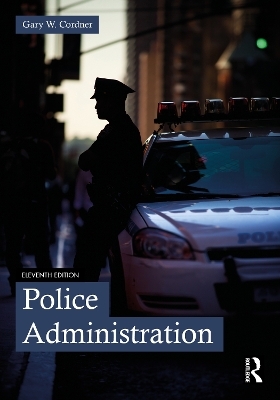
Police Administration
Routledge (Verlag)
978-1-032-25365-7 (ISBN)
Police Administration, 11th Edition, is a best-selling textbook that examines police administration from multiple perspectives: a systems perspective (emphasizing the interrelatedness among units and organizations); a traditional, structural perspective (administrative principles, management functions, and the importance of written guidelines); a human behavioral perspective (the human element in organizations); and a strategic management perspective (communications and information systems, performance evaluation, strategies and tactics, and prevailing and promising approaches to increasing effectiveness of police agencies).
Management functions and organizational principles are defined and explained while providing an emphasis on evidence-based policing, diversity principles, and developing police agencies as learning organizations. A concluding chapter covers contemporary themes such as community engagement and collaboration, important issues such as police legitimacy and predictive policing, and modern management perspectives such as emotional intelligence and servant leadership. Case studies based on real-life events invite students to practice managing conflicting circumstances, and Modern Policing blog posts offer up-to-date news and breaking developments in the policing world.
This book is suitable for undergraduates studying police management and supervision in the US and for practitioners seeking promotion to senior management roles. The ancillaries available include instructor’s manual, test bank, and lecture slides for faculty and case studies for student use.
Gary W. Cordner is Academic Director in the Education & Training Section of the Baltimore Police Department. He is also Professor Emeritus at Kutztown University of Pennsylvania and Eastern Kentucky University. He served as Chief Research Advisor for the National Institute of Justice and Senior Police Advisor for the International Criminal Investigative Training Assistance Program (ICITAP), both part of the US Department of Justice. He was a Commissioner of CALEA (Commission on Accreditation for Law Enforcement Agencies) for nine years and has been associated with the Center for Problem-Oriented Policing since its inception. Earlier in his career he was a Police Officer and Police Chief in Maryland. Cordner taught at Kutztown University after teaching for 21 years at Eastern Kentucky University (EKU), including five years as Dean of the College of Justice & Safety. At EKU he also founded and directed the Regional Community Policing Institute and the International Justice & Safety Institute. Before joining the faculty at EKU, he taught at Washington State University and the University of Baltimore. He maintains the Modern Policing blog at https://gcordner.wordpress.com, which comments on news and developments in the policing world. Cordner is a Past Member of the Kentucky Law Enforcement Council, the Kentucky Criminal Justice Council, and the Lexington/Fayette County Civil Service Commission; Founding editor of Police Quarterly and Past Editor of the American Journal of Police; and Past President of the Academy of Criminal Justice Sciences (ACJS). He is the Recipient of the Academy Fellow Award, the Bruce Smith Sr. Award, and the Outstanding Paper Award from ACJS, in addition to the O.W. Wilson Award from the Police Section of ACJS, the Outstanding Educator Award from the Southern Criminal Justice Association, and outstanding alumnus awards from Northeastern University and Michigan State University.
PART I—Basic Considerations
Chapter 1—Introduction to Police Administration
Chapter 2—The Nature of Police Work
Chapter 3—Police Goals and Systems
Chapter 4—Police Organizational Tasks
PART II—The Traditional Perspective
Chapter 5—Principles and Policies in the Police Organization
Chapter 6—Functions of Police Management
Chapter 7—The Police Executive
PART III—The Human Perspective
Chapter 8—Individuals and Groups in the Police Organization
Chapter 9—Developing the Police Organization
Chapter 10—Leadership in the Police Organization
PART IV—The Strategic Management Perspective
Chapter 11—Information in the Police Organization
Chapter 12—Evaluating Police Performance
Chapter 13—Police Strategies and Tactics
Chapter 14—Police and Homeland Security
Chapter 15—Contemporary Issues in Police Administration
CASE STUDIES
| Erscheinungsdatum | 16.02.2023 |
|---|---|
| Zusatzinfo | 13 Line drawings, black and white; 13 Illustrations, black and white |
| Verlagsort | London |
| Sprache | englisch |
| Maße | 178 x 254 mm |
| Gewicht | 920 g |
| Themenwelt | Geisteswissenschaften ► Psychologie ► Allgemeine Psychologie |
| Geisteswissenschaften ► Psychologie ► Arbeits- und Organisationspsychologie | |
| Recht / Steuern ► EU / Internationales Recht | |
| Recht / Steuern ► Strafrecht ► Strafverfahrensrecht | |
| Sozialwissenschaften ► Soziologie | |
| Wirtschaft ► Betriebswirtschaft / Management ► Personalwesen | |
| ISBN-10 | 1-032-25365-7 / 1032253657 |
| ISBN-13 | 978-1-032-25365-7 / 9781032253657 |
| Zustand | Neuware |
| Informationen gemäß Produktsicherheitsverordnung (GPSR) | |
| Haben Sie eine Frage zum Produkt? |
aus dem Bereich


